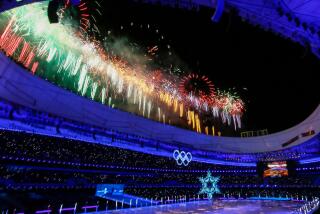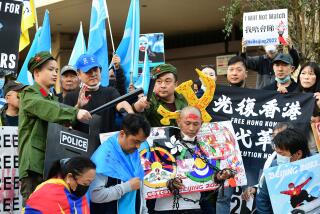IOC’s Rogge calls China protests a ‘crisis’
- Share via
BEIJING -- Crisis. Disarray. Sadness.
Four months before the opening of what was supposed to be the grandest Olympics in history, the head of the International Olympic Committee was using words Thursday that convey anything but a sense of joyous enthusiasm.
The protest-marred Olympic torch relay and international criticism of China’s policies on Tibet, Darfur and human rights have turned the Beijing Games into one of the most politically charged in recent history and presented the IOC with one of its toughest tests since the boycott era of the 1970s and ‘80s.
“It is a crisis, there is no doubt about that,” IOC President Jacques Rogge said. “But the IOC has weathered many bigger storms.”
At the same time, Rogge called on China to respect its “moral engagement” to improve human rights and to fulfill promises of greater media freedom. He also reaffirmed the right of free speech for athletes at the Beijing Games.
A Chinese Foreign Ministry spokeswoman responded that IOC officials support adhering to the Olympic charter and “not bringing any irrelevant political factors into the Beijing Olympics.”
“I hope the IOC officials will continue to adhere to the principles set by the Olympic charter,” Jiang Yu said.
Rogge spoke in Beijing just hours after the completion of the torch relay in San Francisco, where the route was shortened and the flame diverted to prevent disruptions by massive crowds of anti-China protesters.
“Fortunately, the situation was better in San Francisco” than in London and Paris, Rogge said. “It was, however, not the joyous party that we had wished it to be.
“Athletes in many countries are in disarray and we need to reassure them.”
More to Read
Go beyond the scoreboard
Get the latest on L.A.'s teams in the daily Sports Report newsletter.
You may occasionally receive promotional content from the Los Angeles Times.






